- Home
- Douglas Niles
The Coral Kingdom Page 3
The Coral Kingdom Read online
Page 3
But in another moment, she stepped back and wiped her eyes. Pawldo gave her a hand as she stepped up from the hull onto the dock, and again she was a High Princess, returned to the town of her family’s clan.
The Ffolk were not a great people to observe formality and ceremony, so there was no turnout of the castle guard or any such display at the wharf. Earl Randolph was present, however, and he quickly joined Pawldo in greeting Alicia and her party.
The earl had been a young captain who fought for King Kendrick twenty years earlier, in the Darkwalker War. When Tristan went to rule in Callidyrr, he appointed the loyal warrior as seneschal in Corwell, and later made him an earl. Now Randolph’s eyes, too, were moist as he bowed to the princess. She introduced her companions as they climbed from the Coho’s shallow hull.
“Do you recall young Hanrald Blackstone?” she asked Randolph. “Now the Earl of Fairheight?” Hanrald bowed formally, then extended a hand to his fellow earl.
“Indeed—your service to our lady princess has been well told by the bards!” proclaimed Randolph. “It is an honor to have you as my guest.”
“And Brandon Olafsson, Prince of Gnarhelm,” continued Alicia. “He provides us with the fast transport—and more, for without his aid, we would not have broken the thrall of the Stormbringer.”
“King Kendrick has done our people a lasting service when he made peace with the northmen,” said Randolph, bowing with easy grace to the prince. “My honor is doubled to have such an esteemed ally as another guest!”
Brandon flushed in embarassment. Such niceties of diplomacy always discomfitted him. “Well, thank you,” he finally remembered to say. “And the transportation might have been faster,” he reminded Alicia, “if we’d had the use of my own Gullwing.”
The prince’s eyes swept the horizon wistfully, as if he expected that proud longship, sunk by the tempest of Talos the Stormbringer, to come sailing toward them. Alicia knew that one of Brandon’s countrymen had willingly given him use of the Coho, but the love he had felt for his own vessel was clearly lacking with the new longship.
“Your mother will arrive soon?” inquired Earl Randolph, drawing Alicia’s attention.
“Yes. She rides the wind now, as she did when she was younger. The love of the Earthmother, I think, is the only thing that lifts her spirits.”
“And your sister?” inquired Randolph, with a meaningful look along the hull of the longship. The rest of the crew, longhaired northmen sailors to the last unshaven face, stared back. It was quite obvious that Princess Deirdre was not present.
“She, too, arrives under powers other than sail,” Alicia said, mildly irritated at the thought of Deirdre’s icy arrogance when she had declined Brandon’s invitation to sail on the Coho. Her younger sister’s dalliance with magic seemed to Alicia to be a vexing pastime. It annoyed her that Deirdre planned to teleport from Alaron to Gwynneth. Still, Alicia had trouble understanding the stark concern that others, notably Keane and Robyn, had expressed about Deirdre’s mysterious powers.
“Many of the lords have gathered,” noted the earl, pointing to the field full of colorful tents that lay between the town and the castle. Different banners flew from many, and at first glance, Alicia saw the boar of Lord Koart and the unicorn of Dynnatt, two of the local cantrevs. Farther away streamed the white banner of King Truac of Snowdown. Soon all the lords and kings of the Ffolk would be gathered for the High Queen’s court.
And above the field rose Caer Corwell, with its partially completed stone wall joining the wooden palisade. The towers of the keep rose beyond the wall, and the whole structure crowded the steep-sided knoll that placed it in command of all the ground for miles in every direction.
Suddenly the little castle seemed like home to her—a home she missed very much. Though she had spent most of her life living in Caer Callidyrr, her time in Corwell had included many idyllic summers. Now, as that season came once again to the Moonshaes, she wanted nothing quite so much as to pass through those great doors and enter the cooling shelter of the family hall.
* * * * *
Talos the Stormbringer, god of maelstrom and cyclone, deity of destruction and chaos, brooded malevolently as he pondered his lust for revenge. A monstrously powerful god, Talos was not used to frustration, yet a short while ago, when he had thought that he stood at the brink of his mightiest accomplishment, he had instead suffered the greatest defeat in a long and combative existence.
The crux of his hatred, and his defeat, was the island group called the Moonshaes and the people known as the Ffolk. These enchanted isles were places of sublime and ancient power, but power that had of late drifted in a vacuum. A yawning space had beckoned the Destructor like a bottomless pit, urging his own claim to the lands and seas.
And so Talos had sent Coss-Axell-Sinioth, his most trusted servant, a vile being of corrupt origins and deepest evil, to plant the seeds of war in the land. Talos also enlisted the aid of undersea minions, the sahuagin—ravenous predators, ever eager to serve his cause. The most faithful of these was the king of the fishmen, Sythissal.
Aided by the fierce and bloodthirsty sahuagin, the forces of evil had assailed the Moonshaes. Talos quickly neared complete mastery of the isles. Only the tattered remnants of a dying faith and a dead goddess had stood in his path.
But then those remnants had flared to life. The goddess Earthmother, hallowed mistress of the Moonshaes, surged into the world from an absence that had been perilously near, but not quite, permanent. The goddess reborn infused the land with vitality, and Sinioth, the agent of Talos, had been banished to a nether plane.
There, in the few short weeks that had passed, the avatar of evil had suffered what seemed to be an infinity of torture and suffering, punishment for his failure, meted out to him by his dark master. Now, however, Talos summoned Sinioth to face him. The avatar appeared immediately, assuming the body of a withered old man as he stood trembling beneath the wrath of his awful god.
“Coss-Axell-Sinioth! You failed me once. Do you dare attempt my works again?”
“Please, Master, I beg for a chance to redeem myself!” wheezed the frail form, his voice tremulous.
“Dare I trust you?”
“I beseech you, O Mighty One, allow the chance to prove my worth! It is true that I failed to succeed in your name and deserve nothing more than your immortal scorn, your disgust and loathing! But remember, O Master!”—here the voice became more courageous, wheedling persuasively—“I planted the tool, the mirror of scrying, that still allows you to witness the world, to spy on your enemies!”
“Bah!” snorted Talos haughtily. “I have seen naught of that glass!”
“Time, O Great One … it will take only a short time, I am certain, before the Kendrick princess discovers it. She will cherish the mirror, Master, and through it, you will see all that she beholds! She will give you a window into the lives of your greatest enemies!”
“You may speak the truth,” mused the god, considering the possibility that this time Sinioth’s plan would succeed. Talos also had another source of good fortune—a piece of luck that encouraged him to quickly reenter the fray.
“There is a tool—a bargaining chip—that has come into my hands,” he informed his avatar, “that will prove an even greater asset than the mirror! It is for this purpose I have summoned you!”
Talos sent Coss-Axell-Sinioth back to the Realms, for he needed the avatar to carry word of that asset back to the Ffolk. Talos wanted them to suffer—very much indeed.
2
Council In Corwell
The fields and moors around Corwell teemed with tents, makeshift pastures, and practice yards. Riders galloped here and there, and dozens of banners, denoting all the major lords of the Ffolk, streamed from the peaks of the grandest of the tents.
Many of the nobles themselves had been given lodgings in Caer Corwell, or located accommodations in the many inns of the town, all of which charged top price for the several weeks of this unprecedented midsummer c
ourt. But teeming Ffolk quickly overran the relatively small community, and thus the sprawling tent city had soon claimed Corwell’s environs.
The Ffolk came from all across Gwynneth, and many ships had arrived from the islands of Snowdown, Moray, and of course Alaron. Several tall galleons and a number of tublike curraghs bobbed in the harbor, although the Coho was the only longship present.
Jousts and tourneys occurred daily throughout the gathering. Even now, in the morning, both male and female warriors trained vigorously in dozens of impromptu practice yards. Minstrels plied the crowds, while bakers and brewers did a season’s worth of business daily. An occasional thief slipped his way among the populace, slicing a purse string here or picking a pocket there, but the Ffolk were an alert and frugal people, not prone to carelessness with their precious coins. Those dishonest rogues unfortunate or careless enough to be apprehended were divested of their belongings and locked up until they could be placed aboard a ship departing for the Sword Coast. Repeat offenders were hanged.
All the festivity had been building for a week as more and more of the Ffolk reached this small town. Not in the lifetime of any human present had Corwell hosted such a gathering. It brought a warmth and pride to thousands of hearts, for the relatively isolated kingdom had always held an important place in the heritage of the Moonshae people. This had been the home of Cymrych Hugh in centuries past, and now, in their own lifetimes, it had given them Tristan Kendrick and unity.
The High Queen arrived dramatically in late morning. She soared in the guise of a great eagle, a huge bird of the purest white. Circling the high tower of the castle three times in an ever-tightening spiral, she drew the eyes of everyone on the fields and in the town or castle. Then, as her talons touched the rim of the parapet, her form quickly shifted back to the human woman who was so adored by her Ffolk. Robyn’s black hair, unbound this time, trailed in the breeze as she waved to her people.
Their cheers erupted spontaneously and continued for many minutes, long after the queen had disappeared into the humble castle that had been her home for the first eighteen years of her life.
The grand court would not open until the morrow. On this, the day preceding the formal council, the heralds announced that the queen would host a feast for all of her subjects, to be served on the great commons below the castle.
Word of the impending celebration spread rapidly, and when the queen and her elder daughter emerged from the castle in late afternoon, a cheering crowd shouted their devotion along the raised roadway that led down to the field.
“It is like coming home again,” Robyn said to Alicia wistfully. “But then, at the same time, it isn’t.”
“There are memories of Father everywhere around here,” Alicia agreed. “It always seemed that, when the family stayed at Corwell, he had more time for us—he took the time for us.”
Robyn smiled, though the tears began to veil her eyes. “He must have remembered his own father when we were here. He always vowed that he would show his children more affection than King Bryan showed to him.”
Alicia looked at the sea of faces spread across the fields below them. She had always enjoyed the attention awarded her rank, and never before had she beheld such a throng. Yet today the sensation was pale, even insignificant. “How can we feel lonely when so many shout their affection for us?”
“Because we’ve lost the one we really desire to hear it from,” Robyn replied. Alicia saw, with surprise, that her mother’s face had hardened. The queen smiled at her subjects, a frozen, formal expression, and the crowd fell in behind them as they approached the commons, already covered with cloths, tables, and benches for the feast.
“The Earl of Corwell has done a commendable job,” observed the princess, beholding an array of canopied tables and great firepits where several massive oxen rotated on huge spits.
“Lord Randolph has ever been an able administrator,” Robyn replied, fondly remembering the young captain to whom Tristan had entrusted his home realm when the High King and Queen first embarked for Callidyrr.
Now all the young Ffolk of the town, it seemed, had turned out to serve the meal, and swiftly the nobles and esteemed citizens were seated. The rest of the Ffolk would eat where they could. Keane, Tavish, Prince Brandon, Pawldo of Lowhill, and the Earl of Fairheight all joined Lord Randolph and the two noblewomen at the head table.
Crusty loaves of bread, hot from the oven, appeared on the tables before them. Wheels of cheese, mild and sharp and all ranges between, complemented the bread, and pitchers of wine and ale overflowed onto the tables. Cooks bustled about, trimming and slicing from the steers and pigs that now entered the final stage of the daylong cooking process.
“Does the lady bard have a song for the occasion?” inquired Robyn, smiling at Tavish.
“There’s a tune I’ve been trying out,” the harpist allowed, her eyes twinkling with pleasure. She slung her lute from her shoulder with a casual flip. “It’s in the early stages, mind you. I’ve been planning to put some work into it when I can find the time.”
The others watched as she tuned a few recalcitrant strings and then strummed a bright chord. “This is a song about Corwell—in the distant past,” Tavish explained as her fingers deftly walked across the strings. “A time when there were as many elves as humans in the isles—more, perhaps. The first verses tell of the birth of the kingdom of Corwell.
“This part of Gwynneth was ruled by King Deric, a good man, brave and heroic. His people lived in peace with the Llewyrr, the elves of Moonshae. Still, the two didn’t mix much.”
She started to sing the verse then, and her listeners saw the proud King Deric of the Ffolk, astride his white charger. The steed pranced on the beach as his piratical enemies fled from the scene of a disastrous battle. The warriors of Gwynneth had just defeated the greatest invasion ever to menace their shores. King Deric was victorious and triumphant, and he used his prestige to forge all the cantrevs of southern Gwynneth into the fledgling kingdom of Corwell.
The strains of the song floated across the field, compelling the attention of all who could hear. Time passed swiftly as the bard wove her tale.
Deric was a good king, and Corwell flourished beyond any other kingdom in the isles. He was a leader just and wise, decisive and merciful. Even the elves made peace with Deric of Corwell. This was in the age when the numbers of elves and humans on Gwynneth were roughly equal, thus the forging of the peace was no small accomplishment.
Many times Deric journeyed to the elven capital of Chrysalis, there to meet with Kaminas, monarch of the elves.
Yet as the years of Deric’s adulthood began to pass, his people worried that he took no wife, left no heir. All the maidens—and a good many of the dames—in his kingdom sought his attention, but he paid them no heed. Unsavory rumors circulated, and the king’s loyal companions slew many a gossiper in late-night tavern duels.
In fact, the king was in love, and his beloved would have granted a splendid heir to the kingdom, for her blood was royal, too, of a strain that had ruled for far longer than the clan of Corwell. Yet the match was unacceptable to both the Ffolk and her own people.
Deric’s beloved was Herene, princess of Synnoria and daughter of Kaminas, the High Elven Lord.
The Synnorian ruler was appalled by his daughter’s attraction to the human king. At first, he tried to coax her toward other beaus, but she showed no interest in even the most handsome elves among all the Llewyrr. Later King Kaminas resorted to sending Herene away from the valley when King Deric’s visits were anticipated.
But the lovers found ways to circumvent these precautions as well. The man would arrive unannounced, or the princess would cut short her departure. Finally Kaminas faced a drastic action, but one he felt necessary to the survival of his kingdom: He closed Synnoria to humans, barring their presence there for any reason. The wizards and clerics among the Llewyrr, with the help of mighty Corellon Larethian, god of all elves, weaved a pattern of spells around Synnoria, blocking all its
borders against human intrusion.
Though he tried many times throughout the remainder of his life, King Deric was never able to find a path into Synnoria. He never saw the elven princess again. Decades later, he died, childless, and a bitter civil war resulted in a series of brutal tyrants holding the throne and wresting it away from each other.
Herene lived for many centuries, and eventually her father compelled her to marriage, yet she, too, perished without an heir. And from that era to this, the bard concluded, the borders of Synnoria remained closed.
On that note, Tavish let the notes of her final chord fade.
The harpist lowered her instrument and caught her breath. Noticing her own hunger, Alicia finally realized that Tavish had been singing for a long time, though the minutes had seemed to pass with a trancelike beauty.
Now the meat was served, and quickly the guests’ attention turned to the food. Pitchers were refilled, but the conversation faded away as men and women alike went to work on their plates.
“Where is the young Princess Deirdre?” Randolph inquired after a while, as they dined on beef and pork, with bowls of thick soup and still more loaves of bread before them. “Will she attend the council?”
“She promised me that she would arrive by tomorrow,” the High Queen replied in clipped tones, “though I encouraged her to attend the feast today.”
“I see.” The Earl of Corwell wisely refrained from further conversation on the topic.
“It’s a delight to have the queen’s presence at our meager Corwellian table,” said the rotund Pawldo, reaching for another rib of pork with both of his ring-bejeweled hands. Though he was a mere three feet tall, his appetite was the match of any of the humans’. The halfling had made his fortune as a merchant but was famed more as the courageous adventurer who had accompanied King Kendrick on his rise to the throne. Now the comforts of his wealth and station generally held him to the confines of Corwell Town or the neighboring halfling community of Lowhill.

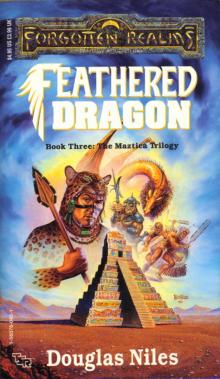 Feathered Dragon mt-3
Feathered Dragon mt-3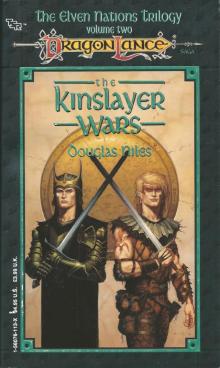 The Kinslayer Wars
The Kinslayer Wars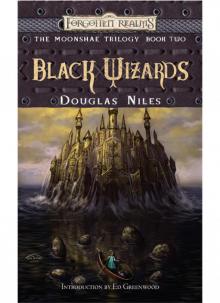 Black Wizards
Black Wizards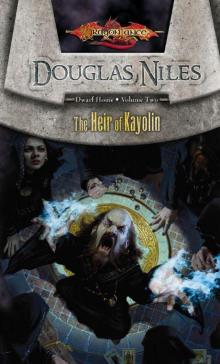 The Heir of Kayolin dh-2
The Heir of Kayolin dh-2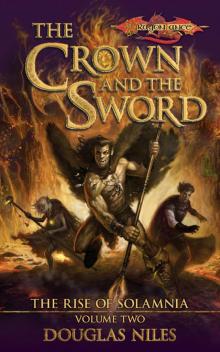 The Crown and the Sword tros-2
The Crown and the Sword tros-2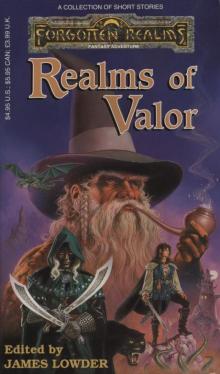 Realms of Valor a-1
Realms of Valor a-1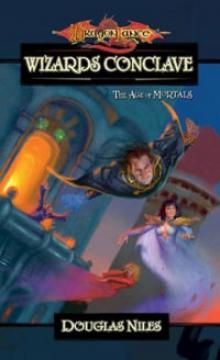 Wizards Conclave aom-5
Wizards Conclave aom-5 Fox On The Rhine
Fox On The Rhine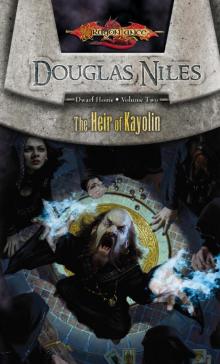 The Heir of Kayolin
The Heir of Kayolin Fox at the Front (Fox on the Rhine)
Fox at the Front (Fox on the Rhine)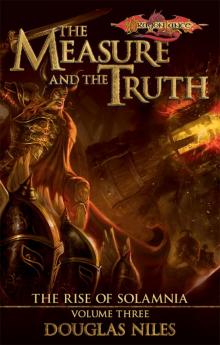 Measure and the Truth tros-3
Measure and the Truth tros-3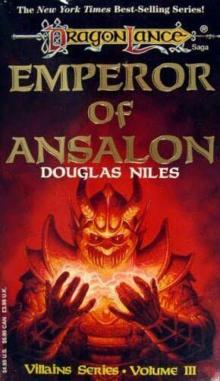 Emperor of Ansalon (d-3)
Emperor of Ansalon (d-3)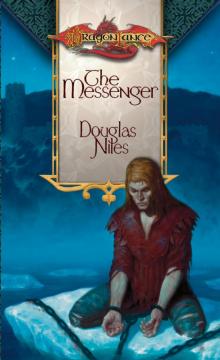 The Messenger it-1
The Messenger it-1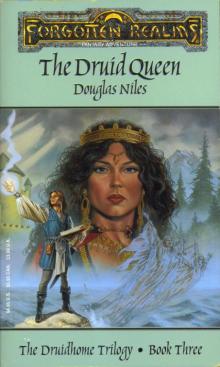 The Druid Queen tdt-3
The Druid Queen tdt-3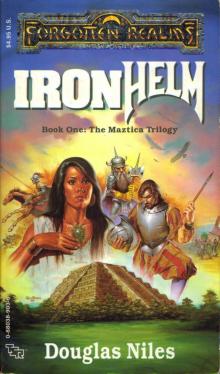 Ironhelm mt-1
Ironhelm mt-1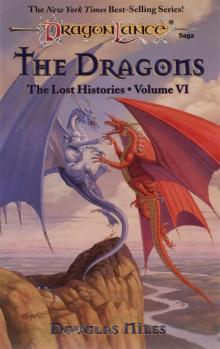 The Dragons lh-6
The Dragons lh-6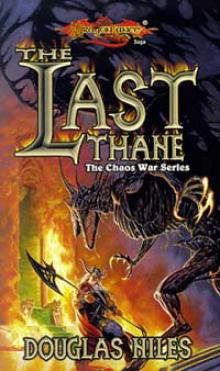 The Last Thane cw-1
The Last Thane cw-1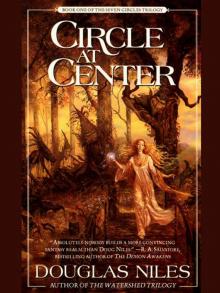 Circle at center sc-1
Circle at center sc-1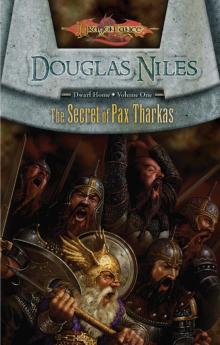 Secret of Pax Tharkas dh-1
Secret of Pax Tharkas dh-1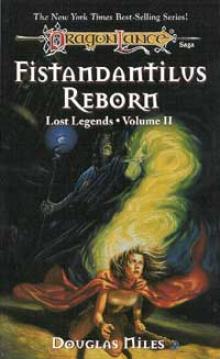 Fistanadantilus Reborn ll-2
Fistanadantilus Reborn ll-2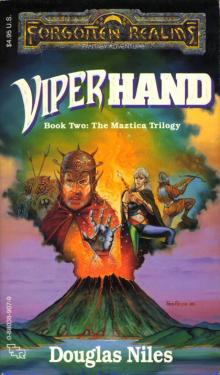 Viperhand mt-2
Viperhand mt-2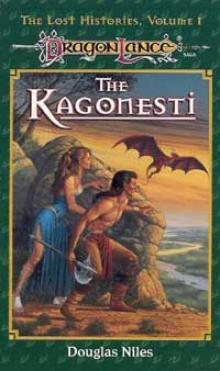 Kagonesti lh-1
Kagonesti lh-1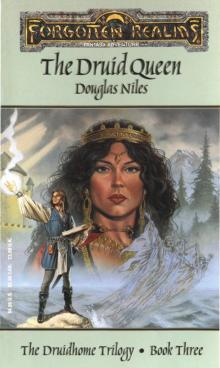 The Druid Queen
The Druid Queen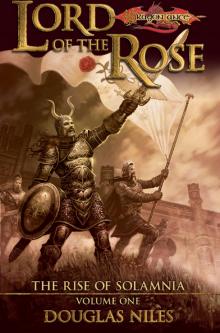 Lord of the Rose tros-1
Lord of the Rose tros-1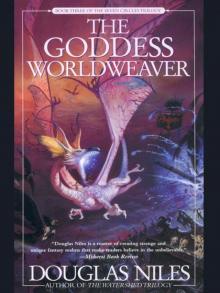 Goddess Worldweaver sc-3
Goddess Worldweaver sc-3 Eyeball to Eyeball (Final Failure)
Eyeball to Eyeball (Final Failure)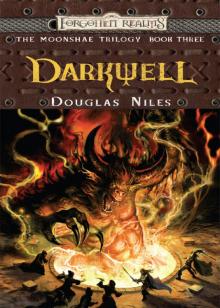 Darkwell
Darkwell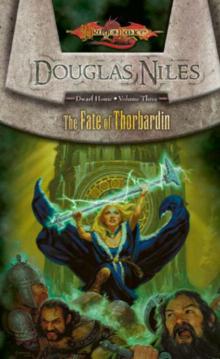 Fate of Thorbardin dh-3
Fate of Thorbardin dh-3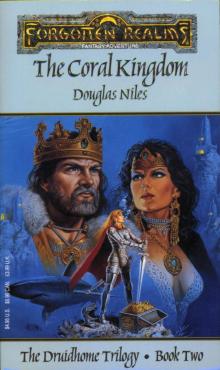 The Coral Kingdom tdt-2
The Coral Kingdom tdt-2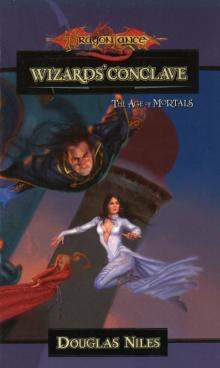 Wizard's Conclave
Wizard's Conclave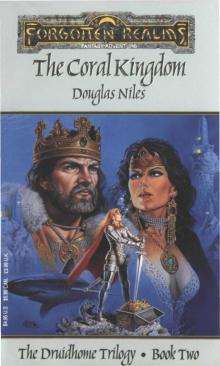 The Coral Kingdom
The Coral Kingdom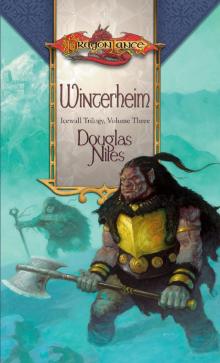 Winterheim it-3
Winterheim it-3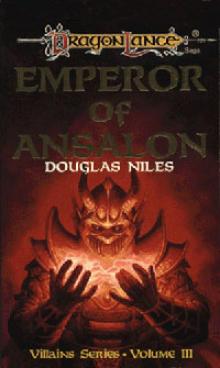 Emperor of Ansalon v-3
Emperor of Ansalon v-3 MacArthur's War: A Novel of the Invasion of Japan
MacArthur's War: A Novel of the Invasion of Japan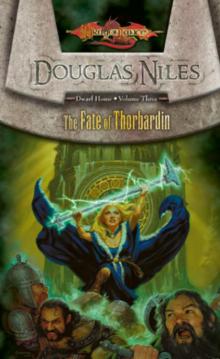 The Fate of Thorbardin
The Fate of Thorbardin The Rod of Seven Parts
The Rod of Seven Parts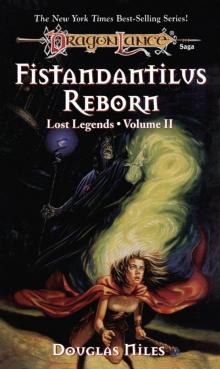 Fistandantilus Reborn
Fistandantilus Reborn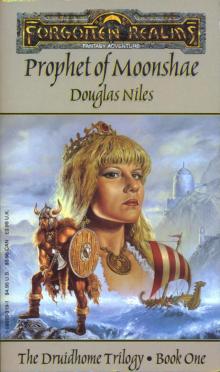 Prophet of Moonshae tdt-1
Prophet of Moonshae tdt-1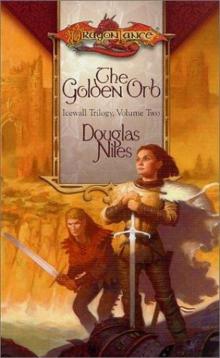 The Golden Orb i-2
The Golden Orb i-2